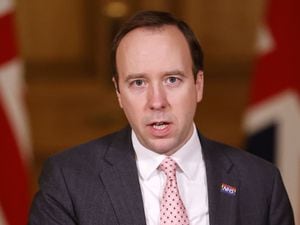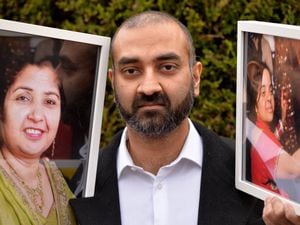‘Some way to go’ before lockdown is eased with pressure on NHS, says Hancock
The Health Secretary said officials are awaiting key data on how successfully vaccines have reduced transmission.

Health Secretary Matt Hancock has said there is “some way to go” before lockdown is eased, as ministers are to begin reviewing coronavirus restrictions in England.
He stressed on Monday that the Government is awaiting key data on how successfully vaccines reduce transmission after more than 15 million people across the UK received their first dose of a vaccine.
Prime Minister Boris Johnson hailed the achievement – just over two months after the vaccination programme delivered its first jab – as a “significant milestone” in the fight against the disease.
Ministers have said they are “on track” to meet the target of getting an offer of a first dose to everyone in the UK in the top four priority groups – including all over-70s – by Monday’s deadline.
The successful rollout of the vaccines will increase pressure from the Conservative backbenches for the Prime Minister to set out a swift easing of the lockdown when he sets out his “road map” on February 22.
Mr Hancock told BBC Breakfast: “We are taking those decisions this week, so we will be looking at the data, looking at the success of the vaccine rollout and how far that has reached and its impact in terms of protecting people, looking at the number of cases and critically, looking at the number of people who are in hospital and the number of deaths – those two factors are vital.
“Right now, as of today, at the latest count there are still over 23,000 people in hospital with Covid – that’s more than in the April peak – so we’ve still got some way to go, but we are looking to set out that road map on Monday.”


Mr Johnson is seeking to take a more cautious approach to easing the restrictions to ensure that England’s third national lockdown is its last, with the re-opening of schools on March 8 the first priority.
The Health Secretary said “we very much hope” that this will be the last lockdown, adding: “Having a sustainable exit – so, lifting the measures in such a way that can be sustainable and we don’t have to have another lockdown – that is obviously an important part of our considerations.”
Mr Hancock cited “early evidence” showing vaccines reduce the spread of Covid-19 by about two thirds.
But he stressed ministers want to “see that actually in the data, not just from the trials”, as well as a drop in hospital admissions and deaths, when considering easing restrictions.
“In some other countries, in Israel, which is one of the very few countries that is ahead of us in the vaccine rollout, you can see that very clearly, so that’s good news, but this is what we will be looking at in the week to come,” he said.
Mr Hancock said he communicates with the Covid Recovery Group (CRG) of lockdown-sceptical Tory MPs “all the time” as ministers consider a “very important and fine judgment”.
Over the weekend, more than 60 CRG members signed a letter calling for the Prime Minister to commit to a firm timetable ending with the lifting of all legal controls by the end of April.
Backbenchers increased the pressure on Monday, with 13 MPs, including the influential chairman of the 1922 committee of Tories Sir Graham Brady and former Cabinet minister Esther McVey, calling for Covid-safe weddings to resume from March 8 before permitting unrestricted ceremonies from May 1.
But Professor Neil Ferguson, a scientist advising the Government’s Covid response, urged caution and said there is “always a risk” around new variants, either from strains emerging from abroad or from home.
“Our current virus, which is the dominant one in the country, only requires one or two more mutations to partially escape immunity – and that means immunity naturally gained or immunity gained by being vaccinated – and so it is imperative that we monitor the situation as closely as we can,” he told ITV’s Good Morning Britain.

Meanwhile, the first international travellers required to isolate for 10 days at Government-designated quarantine hotels arrived at Heathrow Airport on Monday morning.
New rules force UK nationals returning from 33 “red list” countries quarantine at the sites in an attempt to prevent new strains of the virus entering the country.
The Prime Minister confirmed on Sunday that the vaccine target had been met in England after First Minister Mark Drakeford announced on Friday that Wales had reached it.
The passing of the 15 million vaccinations paves the way for the next phase of the rollout – covering the next five priority groups, including the over-50s – to begin.
NHS England has already sent out 1.2 million invitations to the over-65s to book an appointment, with a similar number expected to go out this week.
The Government is aiming to get an offer of a vaccine to the estimated 17 million people in the next five groups by the end of April.
In a video message posted online on Sunday, Mr Johnson said there would “undoubtedly be bumps in the road”.

While he was “optimistic” that a “cautious” easing of lockdown measures would be possible, he said that he did not want to be forced into a “reverse ferret” if there was a fresh resurgence of the disease.
Scientists have warned of a new wave of the pandemic as big as the current one if measures are relaxed too quickly, while senior NHS figures say the health service remains under intense pressure.
Chris Hopson, the chief executive of NHS Providers, warned against easing restrictions “prematurely”, saying they needed to remain vigilant for new variants of the virus which may prove less susceptible to the vaccines.
“We must not let down our guard in our fight against the virus. There is still a lot to understand before we can be wholly certain of the impact of the vaccination programme,” he said.
Ministers have said the re-opening of schools in England on March 8 remains their first priority, although reports have suggested the return may be staggered, with secondary schools going back a week later.





